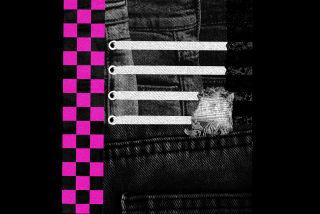Column: Mexican-Americans Come Out 2nd Best in High School Course
- Share via
“The young Mexican-American husband must show his male acquaintances that he has more sexual energy than his wife can accommodate. To prove his prowess, he often continues the sexual hunt of his premarital days. He may demonstrate his physical and financial resources by visiting (a house of prostitution) with drinking companions after an evening in a tavern. The most convincing way of proving machismo and financial ability is to keep a mistress in a second household known as a casa chica.”
A quote from a racist or pornographic tract? No, it’s from a paper until recently used in a Pomona high school sophomore class to teach Mexican-American culture.
Before the instructional material was ordered removed by the board of education, Victor Sherreitt, principal of Ganesha High School, tried to defend the paper in this manner:
“At the beginning of each semester, every teacher looks across his class at inquiring students. In their eyes you see one question formed—’Are you, Mr. Teacher, a phony? Are you going to tell it the way it is?’
“The course, cultural anthropology, offered in the 10th grade is a study of man and his society. In an attempt to have students gain a broad knowledge of the diverse nature of American society, this essay was incorporated into the unit on family and society.”
One wonders if Sherreitt would agree then, that high school sophomores learning about Anglo culture should be taught about Anglo martini-guzzling, pill-popping, wife-swapping suburbanites?
Sherreitt and the social science teachers who incorporated the paper in the course do not seem to realize that the material contains blatant stereotyping.
One of the reasons Mexican-Americans object to the Frito Bandito television commercial is that it stereotypes Mexican-Americans as ridiculous, sleazy bandit types. This can badly damage the self-image of young, impressionable Mexican-American minds and feed prejudice to young, impressionable Anglo minds.
The Ganesha High School paper stereotypes the Mexican-Americans in many ways but tends to emphasize sexual stereotyping. In a section called Marital Conflict, the paper says in part:
“Sexual promiscuity on the part of the wife is a heinous crime. So fragile is the woman’s purity, according to Mexican-American belief, that one sexual indiscretion inevitably leads to a life of complete sexual abandon. No Mexican-American man would remain with a promiscuous wife unless he is already so debased that nothing matters ...”
Then the paper gives an example. Reynaldo’s “excessive drinking interferes with the employment he needs to provide money for liquor. Quenching his thirst is more important to him than sex or respectability so he allows his wife, Flora, to have a generous Anglo lover. Flora maintains this illicit relationship partly to punish Reynaldo for his failings. Her shame about her promiscuity leads her to give her husband most of the money she receives from her lover ...”
Though the paper is no longer used in the course on Mexican-American culture, its very existence and Principal Sherreitt’s written defense of it have left a deep wound in Pomona’s Mexican-American community.
Sherreitt stoutly defends his social science department and says the controversial paper was “misinterpreted or taken out of context.”
Mrs. Ascension Garcia, a school employee who prompted the protest to the board of education, thinks the paper has polarized Pomona’s minority population.
“Suddenly we realized that though Mexican-Americans and Negroes comprise 40% of the 90,000 Pomona population there is not one Mexican-American or Negro school principal or even vice principal,” says Mrs. Garcia.
“So we Mexican-Americans and Negroes have decided to form a coalition to fight the school district’s lack of sensitivity.”
More to Read
Sign up for Essential California
The most important California stories and recommendations in your inbox every morning.
You may occasionally receive promotional content from the Los Angeles Times.











